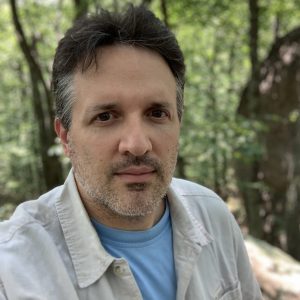On a brisk January morning, during a day of service attended by hundreds of volunteers, families, and community leaders, the Virginia Outdoors Foundation and the Enrichmond Foundation closed the deal on a conservation easement that sets the stage for one of the largest restoration efforts of a historic African-American cemetery in the nation.
The announcement was made on January 21 as part of Enrichmond’s annual Martin Luther King, Jr. National Day of Service cleanup.
More than 200 volunteers braved temperatures in the mid teens to clear weeds from overgrown sections of the cemetery. At 11:00 a.m. a program was held in a heated tent that included performances by the Virginia Union University Choir, a libation ceremony conducted by Janine Bell of the Elegba Folklore Society, and an invocation by Rev. Dr. William Eric Jackson of the Fourth Baptist Church.
Following presentations by community members with family buried at the cemetery, VOF Executive Director Brett Glymph and Enrichmond Executive Director John Sydnor signed a ceremonial copy of the easement deed. Mayor Stoney issued a proclamation thanking VOF, Enrichmond, and the Evergreen Planning and Review Team for their work and encouraging all Richmond citizens to join the effort. Glymph also presented Enrichmond with the keys to a new tractor to help “lighten the load” for the staff and volunteers who maintain the property.
“The easement will provide for the permanent protection and restoration of this cemetery so that future generations can learn from the very important history that resides here,” said Glymph. “To our knowledge, VOF’s grant is the largest of its kind in Virginia history, and possibly the nation’s history. Today, we are recognizing the importance of the lives of the individuals buried here and their countless contributions to our city, to our commonwealth, and to our country, in spite of slavery, and in spite of the oppression of Jim Crow. We look to them for guidance as we continue our work of building community and creating a more fair and just society for all.”
John Sydnor thanked the many volunteers, family members, and city leaders who are supporting the effort. “This place is an amazing, sacred place,” he said. “When you come and are a part of the volunteer work, there is a spirit that takes hold of you. It’s a spirit of integrity, strength, and endurance, and it is made from the collective spirit of those who are interred here.”
With the recordation of the easement and transfer of funds from VOF, Enrichmond will now turn its attention to creating a master plan for the site, which is expected to take several years and require millions of dollars to implement.
Evergreen Cemetery, located on 60 acres in the outskirts of Richmond, was created in 1891 as the final resting place for thousands of African-Americans who were born during or shortly after the end of slavery. Many of them became business, civic, and political leaders during Reconstruction, including the first African-American female to charter a bank in the United States, Maggie L. Walker, as well as businessman, newspaper editor, activist, and politician, John Mitchell, Jr.
Because of segregation, African-Americans could not be buried in white cemeteries. Founders created Evergreen as a monument to their achievements. Enrichmond estimates there are as many as 20,000 people buried at Evergreen, making it one of the largest African-American cemeteries in the nation.
As many African-American families fled Virginia during the early 20th century to escape racial violence and discrimination, the cemetery, which did not have a perpetual care fund, gradually suffered from overgrowth, trash and vandalism. Despite efforts by local volunteers to help care for graves, the property’s condition continued to deteriorate into the 2010s.
Work on the easement began in 2016, when VOF earmarked $400,000 from its Preservation Trust Fund for the project. The funding was contingent on protecting the cemetery with a conservation easement, which places development restrictions on the deed. First, however, Enrichmond had to acquire the property from a private entity. Enrichmond met with the owners over several months, and in 2017 negotiated its purchase. The foundation also hired a full-time caretaker and assembled a team of stakeholders to guide the process, composed primarily of people with family buried at Evergreen.
Among other things, the easement ensures the property will not deteriorate further, buildings must serve permitted uses such as education and visitation, and the property will remain accessible to the public.
Learn more, including how to get involved, at https://enrichmond.org/evergreen-cemetery/.
